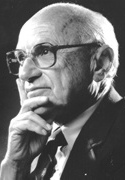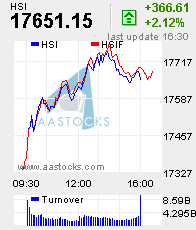Mourning over the death of Milton Friedman --- the Great Contemporary Free Market Thinker

The Nobel Prize winner for Economics in 1976 and the great free market thinker, Professor Milton Friedman, passed away today.
Mr. Friedman's central message was that markets work, but that governments could undermine markets by excessive spending and fuelling inflation. His theory - that an increase in the money supply was the cause of inflation - was testified and most central banks today target and concern very much the rate of inflation.
His belief in competitive market and his critique on the attempts of spending more money in the public sector to control unemployment were endured by the government. He was a leading figure of the Chicago school that held the supply of money was the key factor in determining economic growth and the inflation rate. He argued that the money supply should be kept under strict control, as should government spending. He insisted inflation came from noway but the government.
His belief therefore became a major influence on the economic decision of both Mrs. Thatcher of Britain and President Reagan of U.S.A., and has influenced the thinking of most governments today.
His reputation rested on his prediction about the rate of economic growth in the U.S. where he also attacked Keynesian economic policy. His approach was adopted by Ronald Reagan in the 1980s, who also believed in reducing the role of government and cutting taxes. He was also a true good friend of China. He visited China frequently and discussed with Zhao Zi-yang in the 1980's about the Economic Reform in China and contributed a lot of precious opinions. Deeply thank to Mr. Milton Friedman. He is a respectable person.
The famous dictum "there's no such thing as a free lunch" popularized by him is widely used today and leading to efficient use of resources.
by wongtc also at http://wongtc.blogspot.com/
The Power of Choice - Milton Friedman:
Attached with the recent article written by MILTON FRIEDMAN on October 6, 2006 on Wall Street Journal ------ " Hong Kong Wrong"
It had to happen. Hong Kong's policy of "positive noninterventionism" was too good to last. It went against all the instincts of government officials, paid to spend other people's money and meddle in other people's affairs. That's why it was sadly unsurprising to see Hong Kong's current leader, Donald Tsang, last month declare the death of the policy on which the territory's prosperity was built.
The really amazing phenomenon is that, for half a century, his predecessors resisted the temptation to tax and meddle. Though a colony of socialist Britain, Hong Kong followed a laissez-faire capitalist policy, thanks largely to a British civil servant, John Cowperthwaite. Assigned to handle Hong Kong's financial affairs in 1945, he rose through the ranks to become the territory's financial secretary from 1961-71. Cowperthwaite, who died on Jan. 21 this year, was so famously laissez-faire that he refused to collect economic statistics for fear this would only give government officials an excuse for more meddling. His successor, Sir Philip Haddon-Cave, coined the term "positive noninterventionism" to describe Cowperthwaite's approach.
The results of his policy were remarkable. At the end of World War II, Hong Kong was a dirt-poor island with a per-capita income about one-quarter that of Britain's. By 1997, when sovereignty was transferred to China, its per-capita income was roughly equal to that of the departing colonial power, even though Britain had experienced sizable growth over the same period. That was a striking demonstration of the productivity of freedom, of what people can do when they are left free to pursue their own interests.
The success of laissez-faire in Hong Kong was a major factor in encouraging China and other countries to move away from centralized control toward greater reliance on private enterprise and the free market. As a result, they too have benefited from rapid economic growth. The ultimate fate of China depends, I believe, on whether it continues to move in Hong Kong's direction faster than Hong Kong moves in China's.
Mr. Tsang insists that he only wants the government to act "when there are obvious imperfections in the operation of the market mechanism." That ignores the reality that if there are any "obvious imperfections," the market will eliminate them long before Mr. Tsang gets around to it. Much more important are the "imperfections" -- obvious and not so obvious -- that will be introduced by overactive government.
A half-century of "positive noninterventionism" has made Hong Kong wealthy enough to absorb much abuse from ill-advised government intervention. Inertia alone should ensure that intervention remains limited. Despite the policy change, Hong Kong is likely to remain wealthy and prosperous for many years to come. But, although the territory may continue to grow, it will no longer be such a shining symbol of economic freedom.
Yet that doesn't detract from the scale of Cowperthwaite's achievement. Whatever happens to Hong Kong in the future, the experience of this past 50 years will continue to instruct and encourage friends of economic freedom. And it provides a lasting model of good economic policy for others who wish to bring similar prosperity to their people.
(Mr. Friedman, the 1976 Nobel laureate in economics, was a senior research fellow at Stanford's Hoover Institution before died. )
http://www.opinionjournal.com/editorial/feature.html?id=110009051










